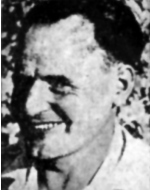Shapiro, Israel (Zuzik)
Son of Bryna and Aharon, was born on May 29, 1905 in the village of Ivankovce in the Podolia region, Russia. He studied in the city of Yelisbetgrad and later in the Gymnasium in the city of Vinnitsa, in order to be closer to his parents’ home. In 1919, after the Communist revolution, he was forced to stop his studies and return home to help his parents work in the farm. In 1923 he joined the underground movement that was in the underground. In 1924 he was arrested and released a few months later. Israel joined training at the Lava Conservatory in the Caucasus and later in Tel Hai in Crimea. In 1927, when he was already married, he was imprisoned and exiled to Siberia and in 1931 was released on condition that he leave the Soviet Union for good. Israel left with his family and immigrated to Israel. After a few months he joined the Kiryat Anavim group, where he raised his three sons. He worked in digging pits to plant fruit trees, in a barn, in a metalwork shop, in a building, and finally found his permanent role as a barber. He was cheerful and joyous in singing, joking, and folk dances he had brought from Russia. Refused to take on management roles, but devoted himself to the Haganah. From his course in Kfar Vitkin he brought home the nickname “Zuzik”, which his friends gave him, and useful information to strengthen security. During the bloody riots of 1936-1939, he was partly responsible for commanding the area. In 1942 he enlisted in the British army and was stationed in the drivers’ corps. Israel served in Company 179, and participated in the invasion of Italy with the Allied forces with the rank of corporal. Where he found a cushion for action in the “Center for the Diaspora,” helping the survivors and organizing the illegal immigration. He devoted himself to this holy work with all his energy and energy, and when he was given the opportunity to advance his release and return home he refused to accept it, because this work fascinated him and saw a vital need to continue it. In 1946 he was released from the British army and returned home, and although he longed to move to farm work, he obeyed the group’s demand and continued to work as a driver. At the end of 1947, when the War of Independence broke out following the United Nations General Assembly resolution on the partition of the country, the road was used for national service of the highest order, and his comrades and family were often disturbed when a convoy was attacked on the road and took part in the fighting. On the day of the 17th of Iyar 5708 (26.5.1948), when he was at the observation post at the sanatorium, when the Arabs shelled the farm from the radar hat, a shell penetrated into the security post and killed him on the spot. Grapes, his memory was raised in the book “On the Road: Kiryat Anavim in the Battle.”
